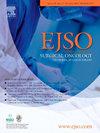Investigation of neoadjuvant gemcitabine plus cisplatin-based triplet regimens on biliary tract cancer with possible lymph node metastasis
IF 3.5
2区 医学
Q2 ONCOLOGY
引用次数: 0
Abstract
Introduction
Biliary tract cancer (BTC) is rare. The treatment outcomes in patients with lymph node (LN) metastasis diagnosed by FDG-PET or a biopsy—who are considered to be ‘biologically borderline resectable’—are poor. However, perioperative treatment is still under development. Recently, gemcitabine plus cisplatin (GC)-based triplet regimens for unresectable BTC have been developed. We applied GC-based triplet therapy in BTC with LN metastasis.
Methods
We administered GC plus S-1 therapy (GCS) or nab-paclitaxel therapy (GCnP) to 30 patients with LN metastasis diagnosed by FDG-PET or a biopsy (GC-based triplet group). A dataset of BTC with FDG-positive LNs, previously used for an analysis of the diagnosis and treatment outcomes according to FDG uptake, was used as a control (upfront surgery group, n = 19).
Results
GCS and GCnP were used by 22 and 8 patients, respectively. The median treatment period was 79 days, the objective response rate was 47 %, the tumor control rate was 87 %, and 22 patients underwent R0 resection (73 %). The groups showed no significant differences with the exception of the FDG uptake by the main tumor. The three-year overall survival (OS) rates in the GC-based triplet and upfront surgery groups were 45.4 % and 15.8 %, respectively (P = 0.0052); there were no significant differences in progression-free or recurrence-free survival. A sub-analysis showed that normalized CA19-9 levels provided better survival than non-normalized CA19-9 levels.
Conclusion
Neoadjuvant GC-based triplet regimens could provide survival benefits in BTC with LN metastasis diagnosed by FGD-PET or a biopsy. CA19-9 normalization may be useful for indicating surgery.
新辅助吉西他滨加顺铂三联治疗胆道癌伴淋巴结转移的研究
胆道癌(BTC)是罕见的。通过FDG-PET或活检诊断的淋巴结转移患者(被认为是“生物学上可切除的”)的治疗结果很差。然而,围手术期治疗仍在发展中。最近,吉西他滨+顺铂(GC)为基础的三联方案已经开发用于不可切除的BTC。我们采用以gc为基础的三联疗法治疗伴有淋巴结转移的BTC。方法对30例经FDG-PET或活检诊断为LN转移的患者(以GC为基础的三联组)进行GC + S-1治疗(GCS)或nab-紫杉醇治疗(GCnP)。使用FDG阳性LNs的BTC数据集作为对照(前期手术组,n = 19),该数据集先前用于根据FDG摄取分析诊断和治疗结果。结果22例患者使用gcs, 8例患者使用GCnP。治疗中位期79天,客观有效率47%,肿瘤控制率87%,22例患者行R0切除术(73%)。除了主要肿瘤对FDG的摄取外,各组间无显著差异。基于gc的三联组和前期手术组的3年总生存率分别为45.4%和15.8% (P = 0.0052);无进展生存期和无复发生存期无显著差异。亚分析显示,规范化CA19-9水平比非规范化CA19-9水平提供更好的生存率。结论基于gc的新辅助三重方案可提高FGD-PET或活检诊断为淋巴结转移的BTC患者的生存率。CA19-9正常化可能对指示手术有用。
本文章由计算机程序翻译,如有差异,请以英文原文为准。
求助全文
约1分钟内获得全文
求助全文
来源期刊

Ejso
医学-外科
CiteScore
6.40
自引率
2.60%
发文量
1148
审稿时长
41 days
期刊介绍:
JSO - European Journal of Surgical Oncology ("the Journal of Cancer Surgery") is the Official Journal of the European Society of Surgical Oncology and BASO ~ the Association for Cancer Surgery.
The EJSO aims to advance surgical oncology research and practice through the publication of original research articles, review articles, editorials, debates and correspondence.
 求助内容:
求助内容: 应助结果提醒方式:
应助结果提醒方式:


